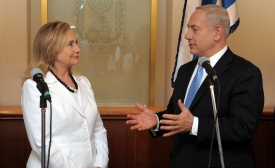israel

Security concerns between states can hinder effective public diplomacy.
At times President Obama sounds almost incoherent on Iran. On one hand he says, like the Israeli prime minister, that he does not see a peace deal in the near future. (“What we can’t do is pretend that there’s a possibility for something that’s not there. And we can’t continue to premise our public diplomacy based on something that everybody knows is not going to happen at least in the next several years.”) So they are on the same page?
Obama's comments at the White House did little to repair rocky U.S.-Israeli relations, which were aggravated by a Wall Street Journal report Tuesday alleging Israel spied on sensitive negotiations about Iran's nuclear program.
The Obama administration has broadcast that since Benjamin Netanyahu announcedthat there will never be a Palestinian state so long as Netanyahu remains Prime Minister of Israel, the U.S. may end its policy of blocking consideration of the Israel-Palestine conflict at the United Nations Security Council.
The Obama administration began its dealings with the Arab world on a hopeful note, as exemplified by the President's 2009 Cairo speech. Since then, despite increased U.S. public diplomacy efforts in the region, American policy has been perceived as hostile, or at least uncaring, toward Arabs.

Philip Seib on what the U.S. is getting wrong in the Middle East.
“Breaking Borders” is a travelogue, cooking show and dining-table summit all in one. And somehow it works, with each component of its cultural, culinary and political mission enhancing the others, at least to judge from the first of its 13 episodes.
Whether the intention behind such actions by members of Congress was to undermine the Obama Administration, to sabotage the nuclear negotiations, or to gain domestic support, they have done nothing but sabotage the image of the United States.







